The search for a comfortable alternative to the traditional hiking boot is a shared endeavor among outdoor enthusiasts. As such, the interest in using Crocs as hiking footwear has seen a notable increase. However, the question remains – is this a practical choice for hiking?
Crocs boast a featherlight design, perfect for hassle-free packing, especially during backpacking adventures. Swift-drying: Crafted from water-resistant materials, Crocs are engineered to dry rapidly, ensuring optimal performance even in damp hiking conditions.
But Some pros and cons are here; we will delve into the advantages and disadvantages of wearing Crocs on the trail. From the comfort they offer to the potential challenges they may present, we aim to provide you with comprehensive insights, equipping you with the knowledge you need before you next hit the trail in your Crocs.
Pros of Wearing Crocs Hiking
Comfortable
Crocs are celebrated for their remarkable cushioning and lightweight design, often making them a preferred choice for shorter, less strenuous hikes.
These characteristics reduce foot fatigue and allow for greater ease of movement.
The generous padding that Crocs offers can provide a soothing experience for your feet, which can be a welcome relief, especially during hikes that don’t demand rigorous footwork.
Therefore, for those looking for comfort and a breezy hike, Crocs might serve as a compelling footwear option.
Breathable
Crocs are designed with strategic ventilation holes, which increase breathability, making them an excellent choice for hikes in warmer climates.
These holes facilitate constant airflow, keeping your feet cool, dry, and comfortable even in hot weather.
They aid in water drainage when crossing streams or wet terrain, thus adding another layer of convenience.
Hence, when it comes to maintaining foot comfort in warm weather hikes, Crocs’ breathability feature is definitely advantageous.
Low Cost
Compared to specialized hiking boots, Crocs come at a relatively lower cost, making them an affordable alternative for hikers on a budget.
Despite their price, they still offer considerable comfort and practical features for light hikes.
This cost-effectiveness, coupled with their practical functionality, makes Crocs an appealing option for hikers looking to save without compromising on comfort.
Hence, if budget is a significant factor for you, the low cost of Crocs can be a compelling reason to consider them for your hiking adventures.
Quick-Drying
Crocs are inherently water-resistant and possess a quick-drying feature, which makes them an ideal choice for hikes involving water crossings or wet conditions.
Unlike traditional hiking boots that may take hours to dry, Crocs can shed water swiftly and return to their dry state in a relatively short time.
This prevents prolonged dampness and discomfort that can lead to blisters or sores.
Therefore, if your hike includes stepping through streams or trekking in the rain, the water-resistant and quick-drying properties of Crocs could prove beneficial.
Lightweight Travel Companion
Crocs are incredibly lightweight, making them an excellent choice for hikers who prioritize packing light and reducing overall trail weight.
Their minimalist design reduces unnecessary bulk in your backpack and helps prevent leg fatigue during long treks.
This attribute also makes Crocs a popular choice for short hikes and convenient secondary footwear for campsites or downtime during multi-day hikes.
So, if lightness and convenience are high on your hiking checklist, the weight advantage of Crocs is definitely a plus point to consider.
Easy Cleaning and Maintenance
Crocs are renowned for their easy cleaning and maintenance.
Made from a water-resistant material, they can be wiped clean – a feature particularly advantageous when dealing with muddy trails or wet conditions during your hike.
Their resilience in the face of dirt and grime, coupled with the fact that they can be quickly air-dried, makes maintaining them a breeze.
The ease of cleaning and maintenance is a bonus when considering Crocs for your hiking adventures.
Convenient Campsite Footwear
After a strenuous day of hiking, Crocs serves as a relaxing respite for your feet around the campsite.
Their airy design and supreme comfort make them ideal for unwinding by the campfire or undertaking camp chores.
By allowing your feet to breathe and recover, Crocs ensures that you can enjoy your downtime without compromising on comfort and foot health.
They are easy to slip on and off, adding to their convenience as perfect campsite footwear.
Convenience
Crocs’ slip-on design is another feature that hikers may find beneficial.
This design allows for easy donning and removal of the shoes, saving time and reducing physical strain.
This is particularly convenient for casual, recreational hikes where speed and efficiency can enhance the overall experience.
Hence, if you’re looking for footwear that is easy to slip into and out of before and after your hike, Crocs may be an option worth your consideration.
Versatile Use
Beyond their application on the trail, Crocs stand out for their versatility in other outdoor settings.
At the campsite, they make excellent footwear for quick errands, providing comfort and ease without the bulk of hiking boots.
Their quick-drying and slip-resistant characteristics also make them ideal for use around lakes, rivers, or pools.
Hence, for outdoor enthusiasts who require practical, multipurpose footwear, Crocs offers an unconventional but potentially beneficial solution.
Cons of Wearing Crocs Hiking
Lack of Support
While Crocs offer ample cushioning, they fall short when it comes to providing ankle and arch support.
This lack of support can lead to discomfort and fatigue during longer hikes, especially on uneven terrain.
Over time, the absence of adequate support can cause foot strain, potentially leading to injuries or impairments in balance during your hiking expeditions.
Limited Traction
Crocs tend to have minimal tread, which significantly reduces their grip on slippery or rocky surfaces.
This lack of traction can be hazardous, increasing the risk of slips and falls during hikes, especially on steep, rocky, or muddy terrains. Therefore, for those planning on tackling challenging trails, the limited traction of Crocs could be a significant drawback.
Durability Concerns
While Crocs are undoubtedly comfortable and versatile, their durability under strenuous conditions is questionable.
Extended use, especially on rugged terrain, could lead to significant wear and tear.
The material from which they’re made may not withstand the rigors of challenging hikes, potentially compromising their lifespan.
So, for demanding outdoor adventures, the durability of Crocs could be a concern.
Risk of Injury
Due to their open design, Crocs offers less protection against potential hazards like stubbing toes or impacts from debris on the trail.
This leaves hikers susceptible to painful impacts and injuries that could hamper their progress or enjoyment of the hike.
As such, the reduced protective feature of Crocs should be considered when contemplating their use for hiking.
Inadequate Ankle Protection
Unlike traditional hiking boots, Crocs fail to provide adequate ankle protection due to their low-cut design.
This exposure can be risky, especially when navigating trails filled with potential hazards or uneven surfaces, putting hikers at an increased risk of ankle sprains or other injuries.
Therefore, the lack of ankle support should be a key consideration when deciding to hike wearing Crocs.
Thin Soles
Crocs have relatively thin soles, which might pose a challenge when venturing on rocky terrains.
Although designed for comfort in urban settings or quick errands, there may be better choices for challenging trails littered with rocks, as the thin soles could allow these uneven surfaces to be felt, leading to discomfort.
Therefore, for hikes on rocky trails, the lack of sufficient sole thickness in Crocs can be a potential drawback.
Slippery Feet
Crocs’ interior can become slippery when wet, creating an unstable footing. This problem is exacerbated if you’re prone to sweaty feet or expect to traverse through watery areas on your hike.
The slipping of feet within the shoe can increase the risk of rolled ankles or falls, thus posing an additional hazard in terms of stability and safety during your hiking adventure.
Holes In The Design
The perforated design of Crocs, while beneficial for quick drying, also allows for other elements to infiltrate.
Tiny detritus such as pebbles, twigs, leaves, insects, and sand can easily find their way through these holes, potentially causing discomfort during your hike.
This susceptibility to external elements might be off-putting for some, adding an extra layer of consideration when thinking about hiking in Crocs.
Best 5 Crocs If You Can Go Hiking In Crocs
While Crocs may not be the traditional choice for hiking, here are five Crocs models that could be considered for casual or less demanding hikes.
Crocs Classic Clog
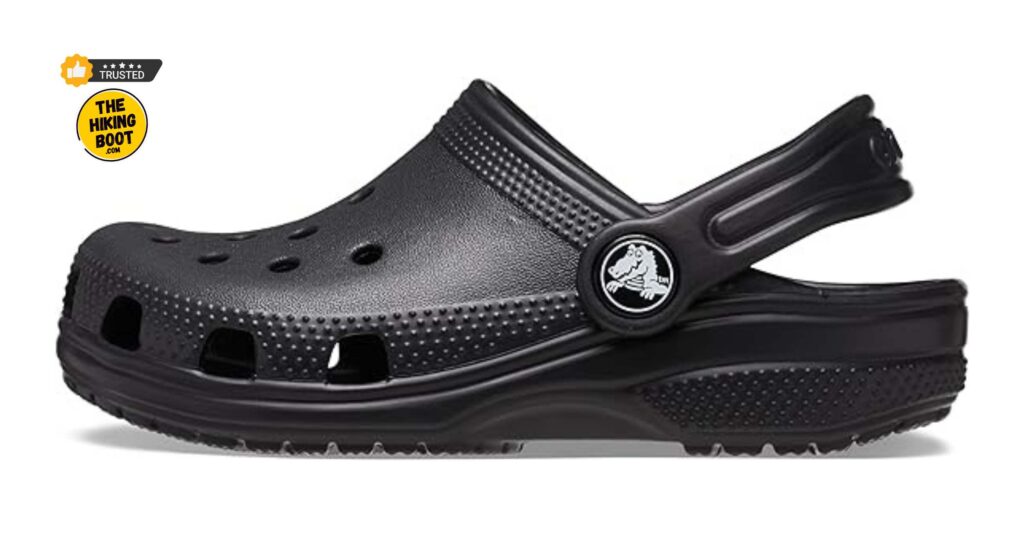
The original Crocs Classic Clog remains a popular choice for its unmatched comfort and ventilation features. While it is not specifically tailored for hiking, this model can serve satisfactorily for brief, uncomplicated hikes along well-maintained trails. Its simplicity and enduring appeal make it a suitable option for those seeking a light-duty, casual hiking experience.
Pros and Cons of the Crocs Classic Clog for Hiking
Pros
- Unmatched comfort: Its cushioning provides a comfortable fit for short, simple hikes.
- Good ventilation: The perforated design allows for breathability, keeping feet dry.
- Easy to wear: The slip-on design makes it easy to put on and take off.
- Versatility: Ideal for quick errands around the campsite.
Cons
- Lack of support: It does not provide adequate ankle and arch support needed for longer hikes.
- Limited traction: Its minimal tread reduces grip on slippery or rocky surfaces.
- Durability: The material may not withstand prolonged, strenuous hikes.
- Exposed design: The open design offers less protection against hazards.
- Thin soles: Its soles are not ideal for rocky terrains.
- Slippery interior: The interior can become slippery when wet.
- Intrusive elements: The holes in the design can allow small debris to get inside the shoe.
Crocs Lite Ride Clog
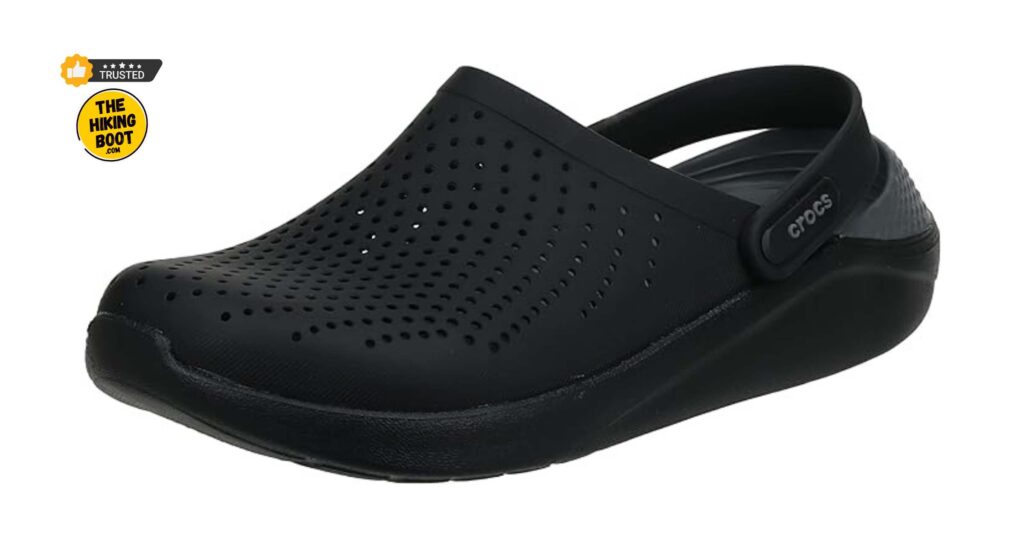
The Crocs LiteRide Clog boasts a contemporary design with improved cushioning and support, making it a suitable choice for relaxed hikes while ensuring comfort throughout the day.
Pros and Cons of the Crocs Lite Ride Clog for Hiking
Pros
- Modern design: Offers a stylish look for your hikes.
- Enhanced cushioning: Provides improved comfort for relaxed hikes.
- All-day comfort: Ensures your feet remain comfortable throughout the hike.
Cons
- Limited support: It may not be suitable for strenuous hikes.
- Lack of durability: Might not withstand challenging terrains.
- Minimal protection: Similar to other Crocs, it offers limited protection against trail hazards.
Crocs Swiftwater Sandal
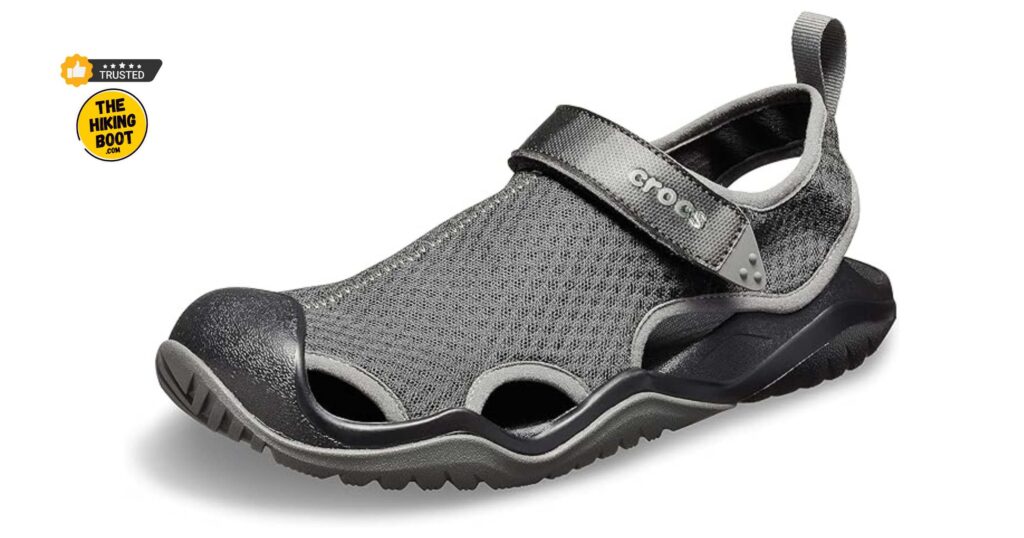
The Crocs Swiftwater Sandal is a suitable option for hikes that involve stepping into water bodies, thanks to its more covered design and adjustable straps for a secure fit.
Pros and Cons of the Crocs Swiftwater Sandal for Hiking
Pros
- More coverage: Offers better foot protection compared to the classic clog.
- Adjustable straps: Allows secure fitting for a comfortable hiking experience.
- 100% Textile
- Imported
- Rubber sole
- Lightweight, Sporty And Adventurous: The Swiftwater Sandals For Men Are All About Comfort And Functionality.
Cons
- Limited durability: May not withstand prolonged, heavy-duty hiking.
- Minimal support: Lacks the required support for challenging hikes.
Crocs Offroad Sport Clog
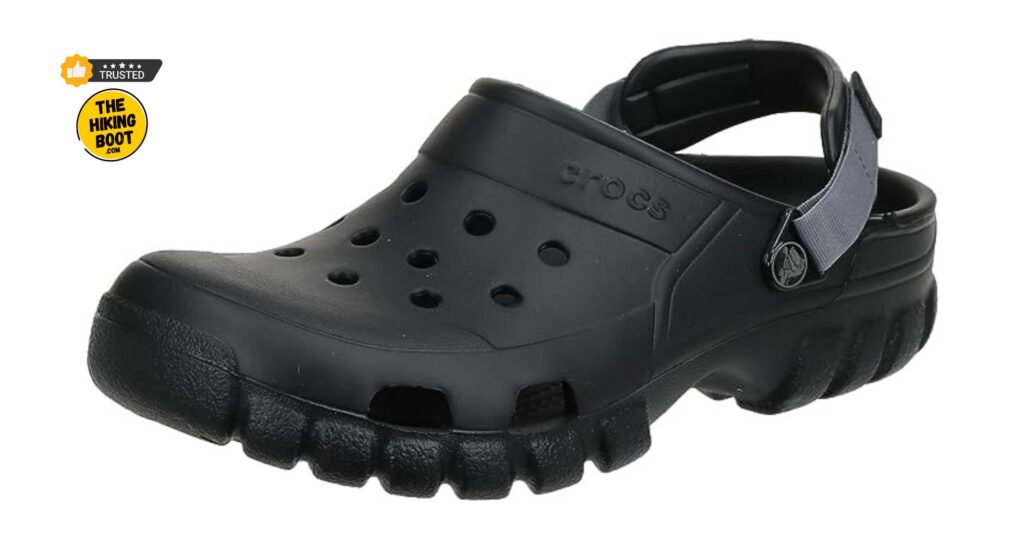
The Crocs Offroad Sport Clog is a more rugged option, designed with adjustable straps and a robust outsole that offers additional support and traction, making them more suitable for light trail use.
Pros and Cons of the Crocs Offroad Sport Clog for Hiking
Pros
- Enhanced traction: Offers better grip on trails.
- Adjustable straps: Provides a more secure fit for hiking.
- 100% Synthetic
- Imported
- Ethylene Vinyl Acetate sole
- The heel measures approximately 2.02.”
Cons
- Limited durability: Might not withstand heavier hikes.
- Minimal protection: Lacks adequate protection against trail hazards.
Crocs All Cast Rain Boot
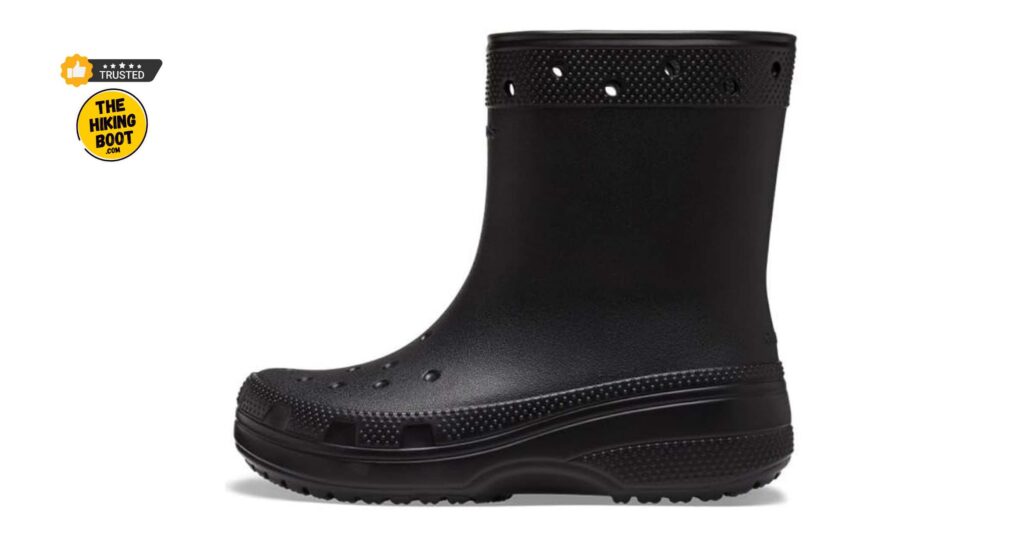
The Crocs AllCast Rain Boot is designed for wet and muddy conditions, offering water resistance and better coverage, making it a suitable choice for milder trails with wet sections. However, it’s not a traditional hiking boot.
Pros and Cons of the Crocs AllCast Rain Boot for Hiking
Pros
- Water resistance: Ideal for wet and muddy trails.
- Better coverage: Offers more protection than other Crocs models.
- Ethylene Vinyl Acetate sole
- The shaft measures approximately Calf High from the arch
- The boot opening measures approximately 16″ around
Cons
- Limited support: Not designed for strenuous hikes.
- Minimal protection: Lacks the robust features of a traditional hiking boot.
Conclusion
In conclusion, while Crocs offer certain advantages such as comfort, ease of wear, and breathability, they are not specifically designed for hiking. They might need more support, protection, and durability. However, with careful selection from the Crocs range and an understanding of their limitations, they can be used for casual, light-duty hiking experiences. Thus, the answer to “Can you go hiking in Crocs?” is a qualified yes – suitable for short, uncomplicated hikes but less so for strenuous, long-distance treks on challenging terrains. Always prioritize safety and comfort when choosing your hiking footwear.
FAQs
Are Crocs comfortable for hiking?
Crocs are renowned for their comfort due to their cushioning and good ventilation. However, the comfort might reduce during longer hikes as they need to provide adequate ankle and arch support.
Which is the most suitable Crocs model for hiking?
The Crocs Offroad Sport Clog is a more rugged option with enhanced traction and adjustable straps, making it suitable for light trail use.
Can you really hike in Crocs?
While Crocs aren’t explicitly designed for hiking, they can be used for short, less demanding hikes on well-maintained trails. However, they might not be suitable for strenuous, long-distance treks on challenging terrains due to their lack of support, protection, and durability.
Can you wear Crocs for hiking in wet conditions?
The Crocs AllCast Rain Boot is designed for wet and muddy conditions, providing water resistance and better coverage. However, it lacks the robust features of a traditional hiking boot.
Do Crocs provide good traction for hiking?
Most Crocs models have minimal tread, reducing grip on slippery or rocky surfaces. However, some models, like the Crocs Offroad Sport Clog, offer better traction.
What are the drawbacks of hiking in Crocs?
The main drawbacks include a lack of support, limited traction, and reduced durability. Also, their open design offers less protection against hazards, and the interior can become slippery when wet.




